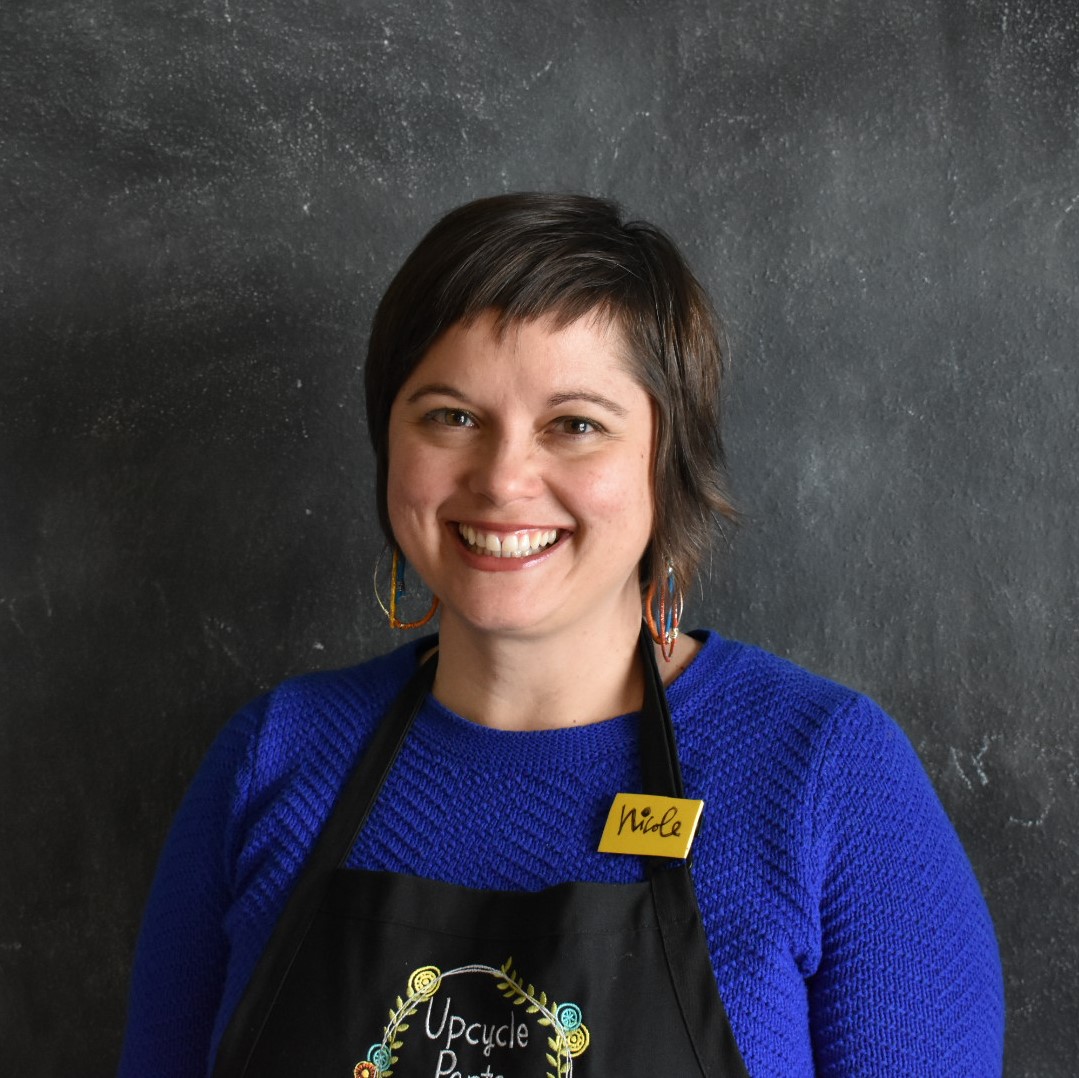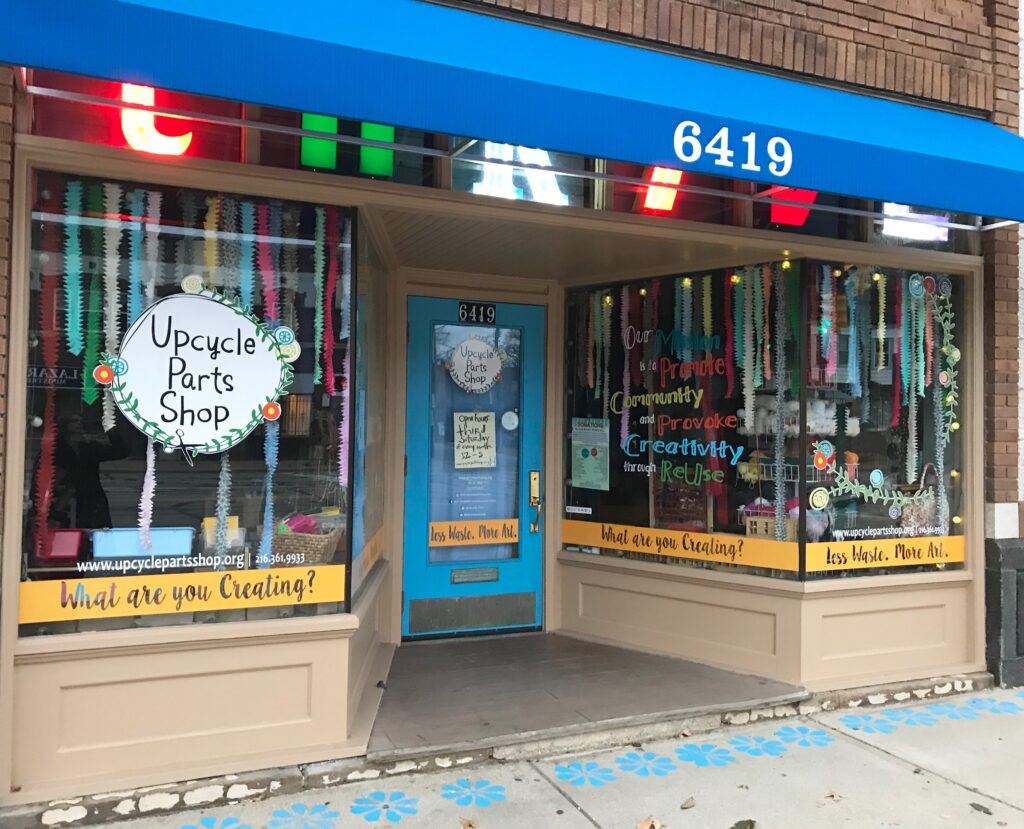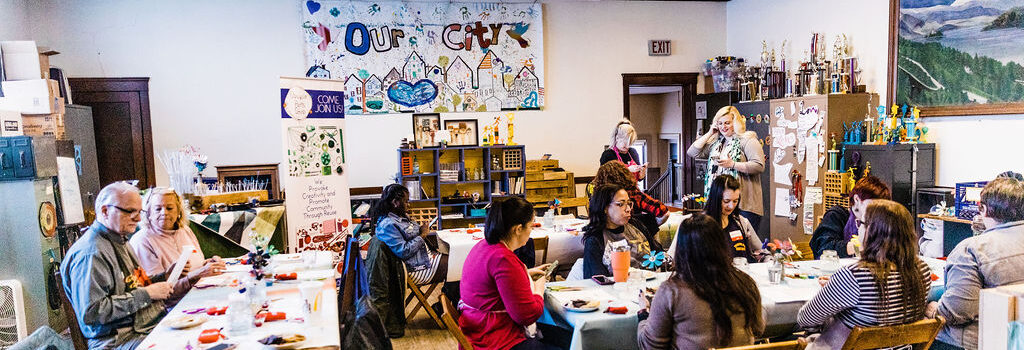ENTREPRENEURSHIP ECOSYSTEM STORIES

Upcycle Parts Shop
The Veale Youth Entrepreneurship Forum has partnered on a mini-hackathon session at the thinkBIG! Summit for the past several years with Upcycle Parts Shop, a leader in sustainable arts and crafts supplies. As 2020 presented new challenges to live programming we created a new program called Upcycle: Enterprise, to present a unique, engaging hybrid mini-hackathon model. Students have the opportunity to participate whether they are learning from home or at school.
We followed-up with Nicole McGee, Co-founder and Executive Director at Upcycle, to learn more about their social entrepreneurship model, Upcycle programs and how they are adjusting in 2020.
Tell us a little bit about Upcycle and the history of the shop?
Upcycle Parts Shop is a social enterprise non-profit organization in Cleveland’s St. Clair Superior neighborhood. We opened our storefront in 2014 in partnership with the local community development corporation. The collaboration was born of a shared goal to open up a new community-based resource that would invite residential neighbors to be creative with us and to strengthen the social fabric of this neighborhood by connecting neighbors to one another. At the same time, our business model was informed by similar places in other cities. The model of “Creative Reuse Centers” exists around the country and I was lucky to connect with a national organization on reuse. Through that Reuse Institute, I got connected to many entrepreneurs building the burgeoning reuse industry nationally, in various ways.

So, per the creative reuse center model, Upcycle Parts Shop is a non-profit business. We call ours a social enterprise, a business with a social mission, and our earned income supports salaries for our employees and operating costs. Our mission is to Provoke Creativity and Promote Community through Reuse.
Generous donors bring us creative, reusable secondhand materials that enable us to operate a retail shop full of secondhand traditional and nontraditional art supplies -for sale at low costs! Our shop is equal parts inspiration and education about the environmental impact of reusing what we have and reducing landfill waste. Also, we assemble kits of creative supplies for community partners, lead workshops, and provide virtual social enterprise educational programming for high school students, thanks to support from the Veale Foundation. Our business model still relies on philanthropic support, but our earned income streams are strong for our young organizational age and we enjoy the mix of mission-based work and running a business.
How did you get started as an entrepreneur and who has helped you along the way?
My first job at age 15 was selling Avon to my teachers, friends, and their parents. I was too young to be an Avon representative myself so my older sister joined me to meet the district representative at the McDonald’s in my small hometown, and we set up in her name. It makes me smile now, that memory. I didn’t realize then that I was beginning a journey that would continue to look like doing work differently than other people. I would (and will) always work hard, getting comfortable with discomfort, trusting myself, and staying curious. But it took me a few decades to start using the word ‘entrepreneur’ to describe myself, and that was only after I started hearing it from others.
We have partnered together on a few programs for local high school students. How has Upcycle: Enterprise been received and what do you enjoy most about working with high school students and educators?
One of the key messages of our work at Upcycle Parts Shop is that the materials we use are within reach of us most of the time. It’s about thinking about and seeing what’s already around us differently. So, it’s exciting to watch people innovate with upcycled materials, for sure.
But also we find that the magic happens when we let ourselves play, like children do so naturally. Working with our hands frees our brain from being in charge, and when we create, design, or build with a few limits, (like what kinds of materials to use, and how much time we have to solve a problem), creativity thrives. It’s been really exciting to guide and encourage that process, then watch it bloom among students and educators alike. We recently hosted a ‘Scrappy Hour’ with educators and they had 20 minutes to work with a limited amount of materials and create a prototype of something they could wear to solve a problem they had. The range of problems and solutions was incredible, and we all were inspired by one another.

What advice do you have for young entrepreneurs just starting out?
We’ve thought about this one a lot, and with my team here at Upcycle Parts Shop, we came up with a little list. Here it is:
- Identify a social problem that really moves you.
You’ll know this by how you feel when you think of it. Maybe it’s homelessness, animal rescue, refugees, environmental, racial equity, human rights… there are a lot of social problems in our world and some of them resonate inside of us more than others. As individuals, we can’t solve them all, but we can work toward improving a few of them. Choose one for now.
- Understand your own unique gifts.
Later you’ll figure out your goals and how your unique gifts will serve those goals, but for now, pay attention. What are the things that feel like gifts to you? We all have them, I promise. One of mine is that people feel comfortable with me, so I can build relationships easily. I try to maintain and build relationships as much as I can, and that has been instrumental to my career path.
- Do research.
Understand the social problem, who experiences it, who is serving them, and how. Innovation can be defined by developing something new and useful. Think about what’s missing and what an innovative solution might be. If possible, learn from the audience affected by the social problem themselves.
- Consider your business model.
Social enterprises are businesses with social impact. What is the business model that could serve the social problem you care about, leverage your gifts/skills, and improve the way the social problem is being addressed currently, and make money? It’s a lot to think about, but everything starts with a plan!
How has Covid-19 impacted your model, the programs you offer and your physical store?
Absolutely it has. We are no longer a social gathering place where connections can be made organically, as we have always identified ourselves to be. We do continue to offer retail hours but they are for private shopping, by appointment only. This has worked for a lot of our customers and has allowed them to have a safe shopping experience with the shop all to themselves, but it is a different model for sure. We’re grateful that our customers have shifted to this by appointment model for our retail shopping and for donating materials. Our programs and workshops have shifted as well, and we’ve been doing a lot virtually. We’ve shifted to preparing materials for individuals in kits, where before we loved to create ‘buffet style’ materials. But if our work is about anything, it is about working with what we have, what is possible, what IS doable, not what isn’t. It has taken a lot of patience with ourselves and openness to doing things differently, but we feel grateful that we are able to continue to meet our mission and run our social enterprise, in new ways.
What are you currently most excited about for Upcycle and what do you think is in store in the future?
One of the most reassuring and surprising aspects, for me personally during this pandemic is the ways our volunteers have surrounded us with sleeves rolled up, ready to help us make this all work, in new ways. We have what we call our Upcycle family, made up of volunteers and neighbors, who have been involved with us over time, and since April we’ve been meeting over zoom weekly with this group. Our work is about connection. We use (and reuse) materials to inspire creativity, and we do this as a means of connection. Neighbors connecting to neighbors, strangers connecting to strangers, people connecting to people, many times across difference; this is what our work is about. The pandemic and the deepened relationships that have come from it have helped me center myself, as the leader of this organization on that distinction. That has been powerful. The work and the business model is how we get to our whole purpose: to connect people to one another in a world that needs more connection. When we remember this, everything feels clearer, and the future of our work feels brighter than ever!
Thank you for asking, thank you for the time to interview me, and thank you for the ways you’ve partnered with us!
